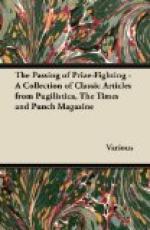BARON DE BOOK-WORMS.
* * * * *
CLASSICAL QUESTION.—If some schoolboys, home for Christmas holidays, wanted Sir AUGUSTUS DRURIOLANUS to give them a Christmas Box (not a private one at the Pantomime), what Ancient Philosopher would they mention? Why—of course—“ARISTIPPUS.”
* * * * *
[Illustration: A LABOUR OF LOVE.
The Vicar. “AND WERE YOU AT THE BALL LAST NIGHT, MRS. RAMSBOTTOM?”
Mrs. R. “OH, YES; I WAS SHAMPOOING EIGHT YOUNG LADIES THERE!”]
* * * * *
LOCAL COLOUR.
Mr. ALFRED AUSTIN, in his new poem, Fortunatus, the Pessimist, has hit upon a new notion, to say nothing of a novel rhyme. Sings he:—
“When the foal and brood-mare hinny,
And in every cut-down spinney
Lady’s-Smocks grow mauve and
mauver,
Then the Winter days are over.”
This opens a polychromatic vista to the New Poetry. Technical Art comes to the aid of the elder Muses. The products of gas-tar alone should greatly regenerate a something time-worn poetic phraseology. As thus:—
When the poet, Mr. PENNYLINE,
Is inspired by beauteous Aniline,
Products chemical and gas-tarry
Give the modern Muse new mastery.
Mauve may chime with love, and
mauver
Form a decent rhyme to lover;
While (and if not, why not?) mauvest
Antiphonetic proves to lovest.
(Verse erotic always sports
Tricksily with longs and shorts.
Verbal votaries of Venus
Are an arbitrary genus,
And as arrogant as HOWELLS
In their dealings with the vowels.
Love, move, rove, linked in a sonnet,
Pass for rhymes; the best have done it!)
Then again there is Magenta!
Surely science never sent a
Handier rhyme to—well, polenta,
Or (for Cockney Muses) Mentor!
The poetic sense auricular
Can’t afford to be particular.
Rags of rhymes, mere assonances,
Now must serve. Pegasus prances,
Like a Buffalo Bill buck-jumper,
When you have a “regular stumper”
(Such as “silver”) do not
care about
Perfect rhyming; “there or thereabout”
Is the Muse’s maxim now.
You may get (bards have, I trow)
Rhyme’s last minimum irreducible,
From dye-vat, retort, or crucible.




